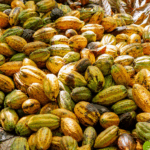
For generations, Ghana’s cocoa farmers have carried the nation’s pride and fortune on their backs. Their beans have built schools, roads, and hospitals; they have fed our GDP and sweetened the world’s chocolate industry.
Yet, paradoxically, these same farmers often remain trapped in poverty, watching their sweat enrich others while they themselves struggle to make ends meet.
In the heat of the 2024 campaign season, the National Democratic Congress (NDC) raised its hopes higher than ever, promising a golden future: a bag of cocoa at GHS 6,000. What a bold promise it was. What hope it stirred. And what a betrayal it has now become.
Fast forward to today, and what do we see? A mere GHS 128.75 increase in the farmgate price—from GHS 3,100 under the NPP to GHS 3,228.75 today. That’s just 4% nominal growth.
Adjusted for inflation, it is actually an 8.5% decline. In plain terms, cocoa farmers are worse off now than they were last season.
This is a betrayal of trust, of labour, and of rural livelihoods. Farmers who were promised GHS 6,000 now struggle to survive on barely 2.15% of that.
These are families who rise before dawn, clear the fields, carry heavy pods, and sustain Ghana’s most iconic export. They deserve dignity. Instead, they’ve been handed deception wrapped in technical jargon.
The NDC government’s repeated refrain has been that it is giving cocoa farmers 70% of the Free on Board (FOB) price. But let’s be clear: that is not the promise the NDC made to farmers. The campaign pledge, repeated by the president himself as recently as July, was 70% of the world market price.
In Ghana, the FOB price is not the same as the global market price; it is a policy-determined figure, calculated by the government using a formula that often masks inefficiencies.
The government insists it is bound by the FoB price, but this very price is weighed down by years of unhonoured contracts and institutional inefficiency.
Cocobod pre-sells up to 70% of projected cocoa output 9–12 months before harvest to hedge against price declines.
While that strategy can provide stability, it backfires when global prices soar, leaving Ghana locked into cheap sales while the world market skyrockets.
And here lies the irony. Years ago, when Cocobod explained that forward contracts meant the FOB price would not match the global market price, the current Finance Minister, Ato Forson, then Minority Leader, flatly rejected that logic.
He insisted that farmers deserved their share of the world price. Today, he finds himself defending the very argument he once dismissed.
The numbers don’t lie. According to the Bank of Ghana, the average international cocoa price between January and June stood at $9,421 per tonne. If the government had truly kept its promise of giving farmers 70% of the world market price, farmers should have been earning about $6,595 per tonne, equivalent to GHS 4,224 per 64 kg bag (using the government’s own exchange rate of GHS 10.25 to $1).
Instead, they are receiving just a GHS 128.75 increase per bag. That’s not just a broken promise but a direct shortchange.
Beyond the price itself lies a deeper question: what reforms have been made at Cocobod to improve efficiency? Every year, cocoa farmers bear the brunt of global volatility and state inefficiency, while Cocobod remains bloated and resistant to real change. Where is the evidence of structural reform? Where is the transparency? Why should farmers continue to suffer because of bureaucratic mismanagement and the costly habit of rolling over contracts?
Cocoa is Ghana’s heritage crop. It is the lifeblood of millions. Yet once again, cocoa farmers have been lured with promises, only to be deceived at the point of delivery.
The NDC government’s boast of honouring its word collapses under scrutiny: 70% of the FOB price is not 70% of the world price. A GHS128.75 increase is not GHS6,000. And the dignity of farmers cannot be traded for excuses and technicalities.
Ghana’s cocoa farmers deserve better. They deserve honesty, fairness, and leadership that sees them not as campaign tools but as the backbone of our economy. Until that day comes, their sweat will continue to sweeten others’ cups while their own lives remain bitter.
